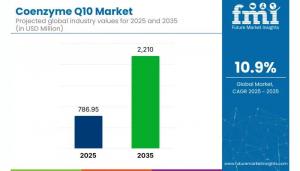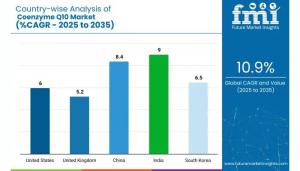Manufacturers Find Growth Catalyst in Booming Coenzyme Q10 Market: Forecast Projects Surge to USD 2,210 Million by 2035
The global Coenzyme Q10 market is set to grow at 10.9% CAGR by 2035, driven by rising supplement, pharma, and cosmetic demand in the United States.
NEWARK, DE, UNITED STATES, August 5, 2025 /EINPresswire.com/ -- The Coenzyme Q10 (CoQ10) market is entering a transformative decade marked by accelerated growth and innovation, driven by a rising global consumer focus on natural health solutions that enhance energy production, cardiovascular wellness, and anti-aging. With the industry poised to nearly triple in size over the next ten years, manufacturers stand at a pivotal point to address evolving challenges and leverage growth opportunities with solution-oriented strategies.
Meeting the Surge in Consumer Awareness and Demand
The global CoQ10 market is forecasted to grow from USD 786.95 million in 2025 to an impressive USD 2,210 million by 2035, reflecting a CAGR of 10.9%. This surge is fueled primarily by increasing consumer recognition of CoQ10’s critical role in supporting cellular energy production, heart health, and skin vitality. Particularly noteworthy is the segment of dietary supplements, which leads the market in 2025 with a 42.1% share, as consumers seek convenient, effective products such as softgels, chewables, and powders.
North America, led by the United States with a steady 6% CAGR, remains the largest growth region due to heightened health consciousness, an aging population, and growing use of CoQ10 in both pharmaceuticals and cosmetics. Emerging markets like India and China, exhibiting faster growth rates of 9% and 8.4% respectively, offer fertile ground for expansion driven by increasing middle-class health awareness and rapid e-commerce adoption.
Addressing Key Manufacturing Challenges
Despite strong market momentum, manufacturers face critical challenges, including regulatory complexity and the high cost of natural raw materials. Stringent regulations, especially within pharmaceuticals and food products, necessitate rigorous compliance efforts, while the extraction of CoQ10 from natural sources presents cost and supply chain constraints.
Industry leaders are responding with innovative solutions. Investments in research and development are focused on enhancing production efficiency, improving formulation bioavailability, and exploring synthetic alternatives. These efforts not only help reduce operational costs but also enable manufacturers to meet strict global standards—key for sustained growth and market penetration.
Innovation at the Forefront: Ubiquinol and Pharmaceutical-Grade CoQ10
Product innovation remains a cornerstone for competitive advantage. Ubiquinol, the reduced form of CoQ10 known for its superior bioavailability, is projected to dominate product segments in 2025 with a 54.7% market share. Its higher absorption rate makes it the preferred ingredient in energy-boosting, anti-aging, and heart health supplements. Companies like Kaneka Corporation and DSM are actively refining ubiquinol formulations to increase efficacy and cater to rising consumer expectations for natural, potent supplements.
Pharmaceutical-grade CoQ10 commands a 60.8% share of the grade segment by 2025, underscoring its importance in clinical and medical applications. As cardiovascular diseases continue to challenge healthcare systems globally, pharmaceutical-grade CoQ10’s role as an adjunct therapy and treatment support is gaining traction. R&D efforts by firms such as Pharma Nord and Kaneka Corporation are focused on improving product effectiveness to satisfy stringent medical standards.
Formulation Versatility Powers Market Expansion
The powder and crystalline forms of CoQ10, which offer versatility and ease of incorporation, are expected to hold a 26.5% share in the formulation segment by 2025. Their adaptability across supplements, functional foods, and beverages makes them cost-effective and popular solutions for consumers seeking reliable energy and heart health support. Industry players like Jarrow Formulas and DSM emphasize enhanced absorption technologies for these formulations to boost product appeal.
Strategic Distribution Channels Enhance Accessibility
Retail pharmacies and drug stores, accounting for 20.3% of CoQ10 distribution in 2025, remain critical touchpoints for consumer access due to their trusted status and personalized service. Leading supplement companies such as GNC Holdings and Vitamin Shoppe are expanding retail presence and promotional initiatives to capitalize on this trusted offline environment. Meanwhile, the growth of e-commerce platforms complements physical retail, broadening reach and providing manufacturers with multiple channels to meet diverse consumer preferences.
Country-Specific Insights Highlight Growth Hotspots
• United States: Steady 6% CAGR supported by aging population, cardiovascular health demand, and innovative product formulations emphasizing transparency and clinical validation.
• United Kingdom: Moderate 5.2% CAGR driven by national wellness initiatives, NHS recommendations, and increasing demand for vegan and allergen-free supplements.
• India: Fastest growth at 9%, fueled by rising lifestyle disease awareness, expanding middle class, affordable local manufacturing, and surging e-commerce penetration.
• China: Strong 8.4% CAGR with health-conscious consumers spanning generations, supported by robust domestic manufacturing and government-backed healthy aging campaigns.
• South Korea: Growth at 6.5%, propelled by a sophisticated preventive health culture, demand for cosmeceuticals, and premium, science-backed products delivered through dynamic online retail channels.
Leading Industry Players Drive Innovation and Market Expansion
The global CoQ10 landscape is shaped by established leaders like Kaneka Corporation, DSM, and Doctor’s Best, who leverage extensive R&D, diverse product portfolios, and strong distribution networks. These companies continuously introduce cutting-edge delivery systems and advanced formulations that elevate supplement bioavailability and consumer satisfaction.
Emerging players such as Xiamen Kingdomway Group and Kyowa Hakko USA are innovating extraction techniques and cost-effective production processes, enhancing accessibility in price-sensitive markets. Additionally, brands including Healthy Origins, Vitamin Shoppe, and Pharmavite focus on specialized regional formulations, meeting localized consumer demands and expanding global footprint.
Request Coenzyme Q10 Market Draft Report - https://www.futuremarketinsights.com/reports/sample/rep-gb-22395
For more on their methodology and market coverage, visit https://www.futuremarketinsights.com/about-us.
A Glimpse into Industry Innovations and Future Trends
In a recent industry highlight, Beiersdorf launched the NIVEA Q10 Dual Action Serum, a breakthrough in skin care combining patented GLYCOSTOP™ technology with CoQ10 to combat sugar-induced skin aging. This innovation underscores CoQ10’s growing application beyond supplements into cosmetics, driving market diversification and cross-sector growth.
Manufacturers embracing such product innovations and sustainable practices are well-positioned to capture growing segments in personal care while maintaining commitment to environmental stewardship.
Related Insights from Future Market Insights (FMI)
CoQ10 Gummies Market
https://www.futuremarketinsights.com/reports/coq10-gummies-market
Ubiquinone Market
https://www.futuremarketinsights.com/reports/ubiquinone-market
Vitamin Premix Market
https://www.futuremarketinsights.com/reports/vitamin-premix-market
Vitamin Gummies Market
https://www.futuremarketinsights.com/reports/vitamin-gummies-market
About Coenzyme Q10:
Coenzyme Q10 is a naturally occurring antioxidant critical for cellular energy production. Widely used in dietary supplements, pharmaceuticals, cosmetics, and functional foods, CoQ10 supports heart health, combats oxidative stress, and promotes youthful skin vitality.
Rahul Singh
Future Market Insights Inc.
+1 347-918-3531
email us here
Legal Disclaimer:
EIN Presswire provides this news content "as is" without warranty of any kind. We do not accept any responsibility or liability for the accuracy, content, images, videos, licenses, completeness, legality, or reliability of the information contained in this article. If you have any complaints or copyright issues related to this article, kindly contact the author above.
Rossario George Wins the 2025 Stellar Business Award for Luxury Lifestyle – Global
PASTOR ALVIN BERNARD UNVEILS REVOLUTIONARY EXPLORATION OF BIBLICAL PROPHECIES IN HIS NEWEST RELEASE
ColoringBook.com expands assortment with characters from PBS KIDS® Series
Więcej ważnych informacji
 Jedynka Newserii
Jedynka Newserii

 Jedynka Newserii
Jedynka Newserii

Handel

Mercosur to tylko wierzchołek góry lodowej. UE ma ponad 40 umów handlowych, które mogą destabilizować rynek rolny
Umowa handlowa między UE a krajami Mercosur może znacząco zaburzyć konkurencję na rynku rolnym i osłabić pozycję unijnych, w tym polskich, producentów – ostrzegają rolnicy i producenci żywności. Umowie sprzeciwia się część krajów unijnych, które domagają się klauzuli ochronnych oraz limitów importowych. – Problemem jest jednak nie tylko ta konkretna umowa. Chodzi o cały system wolnego handlu, który się kumuluje z dziesiątek innych porozumień – podkreśla Andrzej Gantner, wiceprezes Polskiej Federacji Producentów Żywności.
Firma
Dzięki zdalnej weryfikacji tożsamości z wykorzystaniem AI firmy zminimalizowały liczbę oszustw. Rozwiązania wykorzystuje głównie sektor finansowy

Z najnowszych danych Eurostatu wynika, że w 2024 roku 5,9 proc. polskich firm korzystało z rozwiązań z zakresu sztucznej inteligencji. W 2023 roku był to odsetek na poziomie 3,67 proc. Wciąż jednak jest to wynik poniżej średniej unijnej, która wyniosła 13,48 proc. Jednym z obszarów, który cieszy się coraz większym zainteresowaniem wśród przedsiębiorców, jest weryfikacja tożsamości przez AI, zwłaszcza w takich branżach jak bankowość, ubezpieczenia czy turystyka. Jej zastosowanie ma na celu głównie przeciwdziałać oszustwom i spełniać wymogi regulacyjne.
Prawo
Daniel Obajtek: Własne wydobycie i operacyjne magazyny to filary bezpieczeństwa. Zgoda na magazyny gazu poza krajem to rezygnacja z suwerenności energetycznej

Były prezes Orlenu ostrzega przed zmianami w ustawie o zapasach ropy naftowej, produktów naftowych i gazu ziemnego. Jego zdaniem przygotowana przez rząd nowelizacja tzw. ustawy magazynowej i ujednolicanie unijnej polityki energetycznej to zagrożenie dla bezpieczeństwa energetycznego Polski. W jego opinii tylko silna spółka narodowa, własne wydobycie, krajowe magazyny i zbilansowany miks energetyczny zapewnią Polsce bezpieczeństwo i konkurencyjność.
Partner serwisu
Szkolenia

Akademia Newserii
Akademia Newserii to projekt, w ramach którego najlepsi polscy dziennikarze biznesowi, giełdowi oraz lifestylowi, a także szkoleniowcy z wieloletnim doświadczeniem dzielą się swoją wiedzą nt. pracy z mediami.






![Nestlé w Polsce podsumowuje wpływ na krajową gospodarkę. Firma wygenerowała 0,6 proc. polskiego PKB [DEPESZA]](https://www.newseria.pl/files/1097841585/fabryka-nesquik_1,w_85,r_png,_small.png)



.gif)

 |
| |
| |
|